MG414 Organisational Behaviour: Impact of Culture at Tesco
VerifiedAdded on 2023/06/10
|13
|3503
|382
Report
AI Summary
This report delves into the organisational behaviour of Tesco, a British retail company, focusing on the impact of human behaviour and organisational culture. It reviews literature on human behaviour theories, including behavioural, cognitive, and psychodynamic approaches, and their influence on individual, group, and organisational levels. Primary research, through interviews with Tesco employees, explores themes such as ideal company culture, preferred organisational culture, challenges faced, and the ability to work under pressure. The report highlights the importance of a positive organisational culture for employee motivation and productivity, emphasizing the need for effective communication and teamwork. It concludes by recommending strategies to improve Tesco's organisational culture and address challenges related to language barriers and leadership.
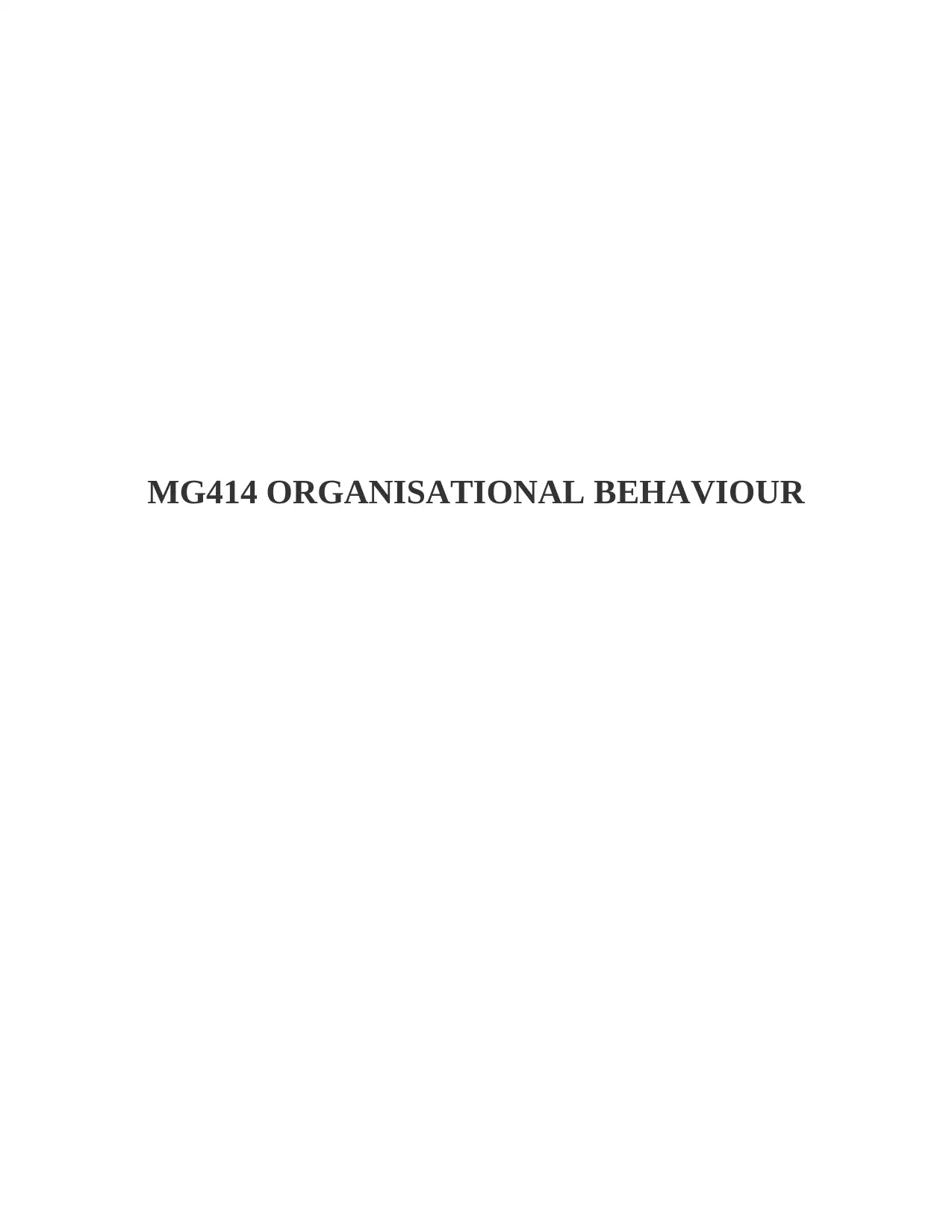
MG414 ORGANISATIONAL BEHAVIOUR
Paraphrase This Document
Need a fresh take? Get an instant paraphrase of this document with our AI Paraphraser
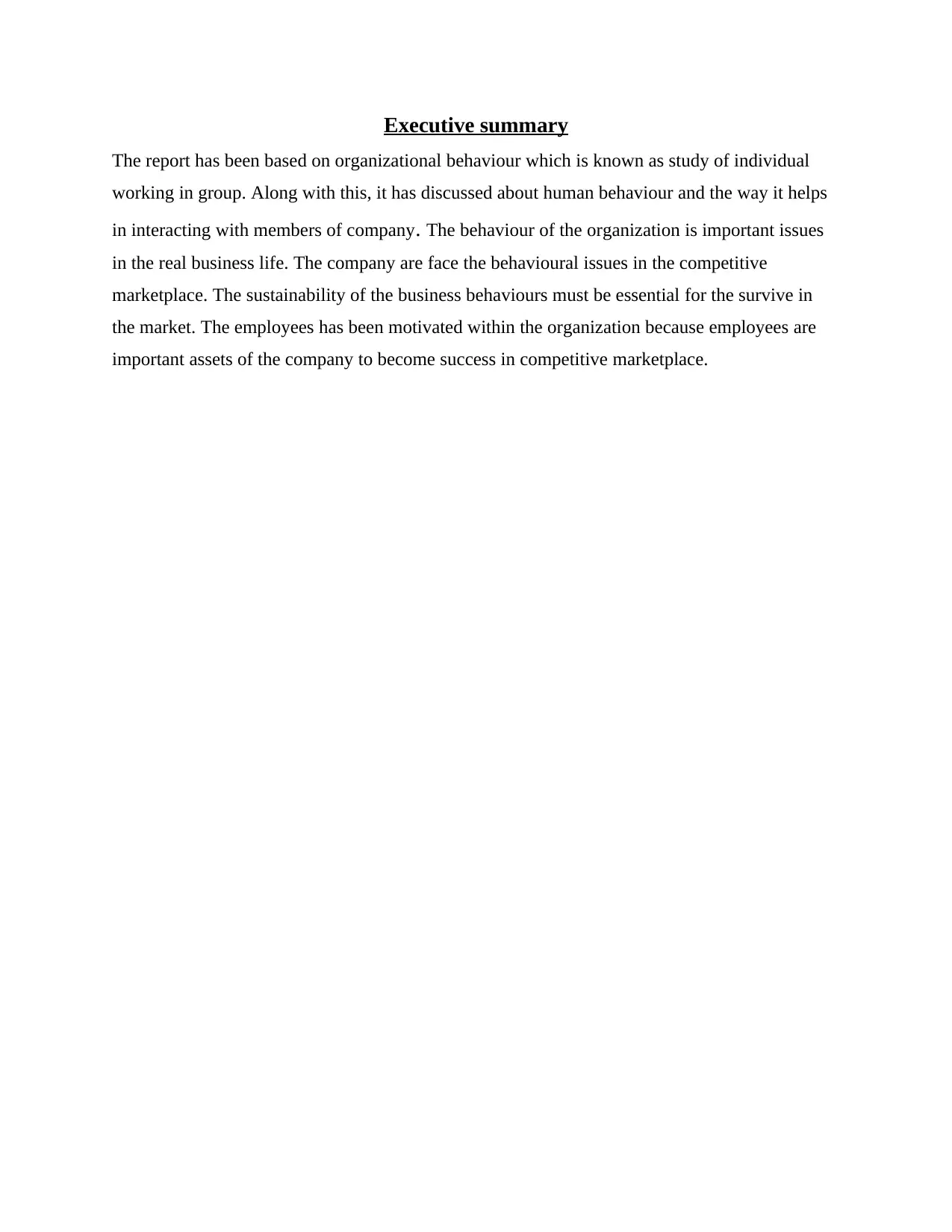
Executive summary
The report has been based on organizational behaviour which is known as study of individual
working in group. Along with this, it has discussed about human behaviour and the way it helps
in interacting with members of company. The behaviour of the organization is important issues
in the real business life. The company are face the behavioural issues in the competitive
marketplace. The sustainability of the business behaviours must be essential for the survive in
the market. The employees has been motivated within the organization because employees are
important assets of the company to become success in competitive marketplace.
The report has been based on organizational behaviour which is known as study of individual
working in group. Along with this, it has discussed about human behaviour and the way it helps
in interacting with members of company. The behaviour of the organization is important issues
in the real business life. The company are face the behavioural issues in the competitive
marketplace. The sustainability of the business behaviours must be essential for the survive in
the market. The employees has been motivated within the organization because employees are
important assets of the company to become success in competitive marketplace.
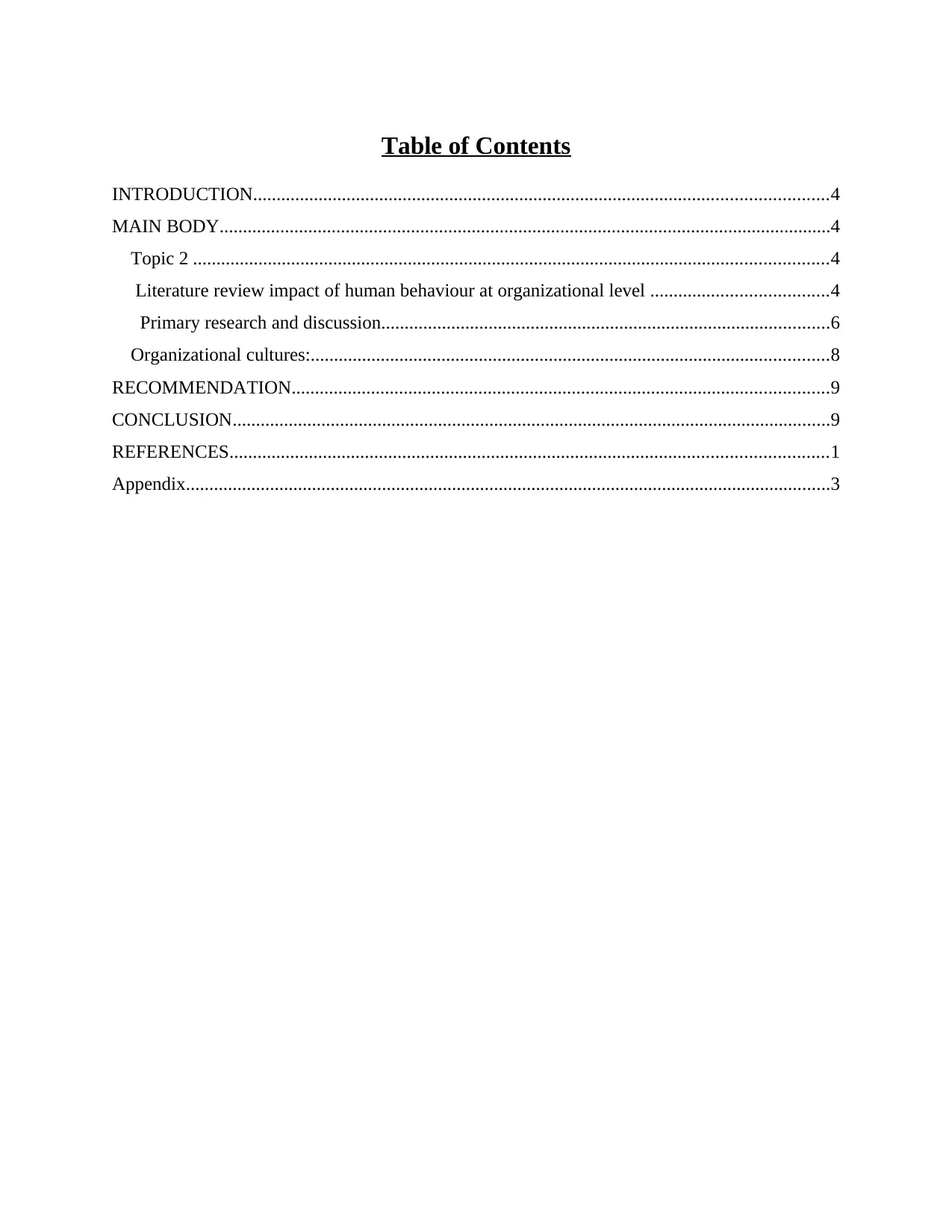
Table of Contents
INTRODUCTION...........................................................................................................................4
MAIN BODY...................................................................................................................................4
Topic 2 ........................................................................................................................................4
Literature review impact of human behaviour at organizational level ......................................4
Primary research and discussion................................................................................................6
Organizational cultures:...............................................................................................................8
RECOMMENDATION...................................................................................................................9
CONCLUSION................................................................................................................................9
REFERENCES................................................................................................................................1
Appendix..........................................................................................................................................3
INTRODUCTION...........................................................................................................................4
MAIN BODY...................................................................................................................................4
Topic 2 ........................................................................................................................................4
Literature review impact of human behaviour at organizational level ......................................4
Primary research and discussion................................................................................................6
Organizational cultures:...............................................................................................................8
RECOMMENDATION...................................................................................................................9
CONCLUSION................................................................................................................................9
REFERENCES................................................................................................................................1
Appendix..........................................................................................................................................3
⊘ This is a preview!⊘
Do you want full access?
Subscribe today to unlock all pages.

Trusted by 1+ million students worldwide
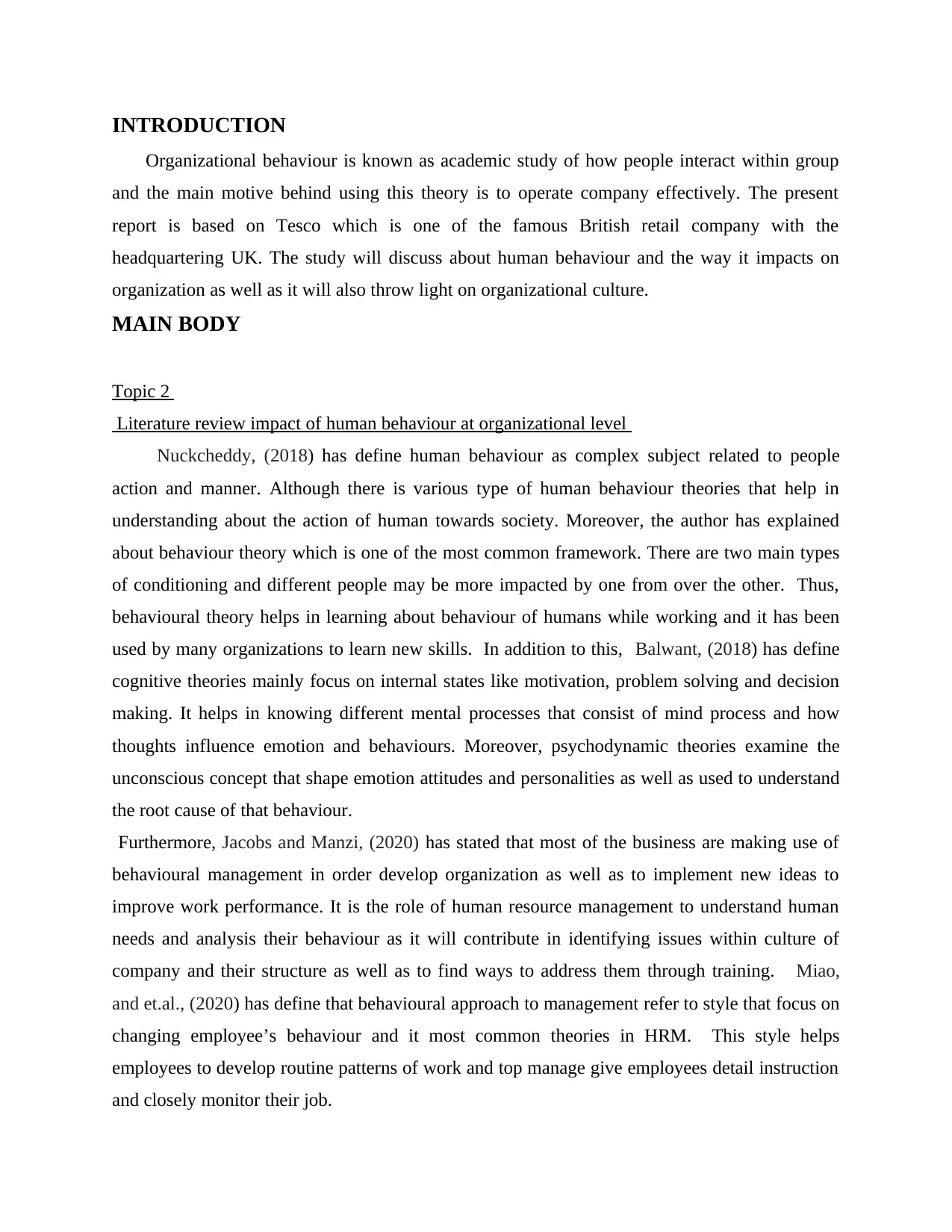
INTRODUCTION
Organizational behaviour is known as academic study of how people interact within group
and the main motive behind using this theory is to operate company effectively. The present
report is based on Tesco which is one of the famous British retail company with the
headquartering UK. The study will discuss about human behaviour and the way it impacts on
organization as well as it will also throw light on organizational culture.
MAIN BODY
Topic 2
Literature review impact of human behaviour at organizational level
Nuckcheddy, (2018) has define human behaviour as complex subject related to people
action and manner. Although there is various type of human behaviour theories that help in
understanding about the action of human towards society. Moreover, the author has explained
about behaviour theory which is one of the most common framework. There are two main types
of conditioning and different people may be more impacted by one from over the other. Thus,
behavioural theory helps in learning about behaviour of humans while working and it has been
used by many organizations to learn new skills. In addition to this, Balwant, (2018) has define
cognitive theories mainly focus on internal states like motivation, problem solving and decision
making. It helps in knowing different mental processes that consist of mind process and how
thoughts influence emotion and behaviours. Moreover, psychodynamic theories examine the
unconscious concept that shape emotion attitudes and personalities as well as used to understand
the root cause of that behaviour.
Furthermore, Jacobs and Manzi, (2020) has stated that most of the business are making use of
behavioural management in order develop organization as well as to implement new ideas to
improve work performance. It is the role of human resource management to understand human
needs and analysis their behaviour as it will contribute in identifying issues within culture of
company and their structure as well as to find ways to address them through training. Miao,
and et.al., (2020) has define that behavioural approach to management refer to style that focus on
changing employee’s behaviour and it most common theories in HRM. This style helps
employees to develop routine patterns of work and top manage give employees detail instruction
and closely monitor their job.
Organizational behaviour is known as academic study of how people interact within group
and the main motive behind using this theory is to operate company effectively. The present
report is based on Tesco which is one of the famous British retail company with the
headquartering UK. The study will discuss about human behaviour and the way it impacts on
organization as well as it will also throw light on organizational culture.
MAIN BODY
Topic 2
Literature review impact of human behaviour at organizational level
Nuckcheddy, (2018) has define human behaviour as complex subject related to people
action and manner. Although there is various type of human behaviour theories that help in
understanding about the action of human towards society. Moreover, the author has explained
about behaviour theory which is one of the most common framework. There are two main types
of conditioning and different people may be more impacted by one from over the other. Thus,
behavioural theory helps in learning about behaviour of humans while working and it has been
used by many organizations to learn new skills. In addition to this, Balwant, (2018) has define
cognitive theories mainly focus on internal states like motivation, problem solving and decision
making. It helps in knowing different mental processes that consist of mind process and how
thoughts influence emotion and behaviours. Moreover, psychodynamic theories examine the
unconscious concept that shape emotion attitudes and personalities as well as used to understand
the root cause of that behaviour.
Furthermore, Jacobs and Manzi, (2020) has stated that most of the business are making use of
behavioural management in order develop organization as well as to implement new ideas to
improve work performance. It is the role of human resource management to understand human
needs and analysis their behaviour as it will contribute in identifying issues within culture of
company and their structure as well as to find ways to address them through training. Miao,
and et.al., (2020) has define that behavioural approach to management refer to style that focus on
changing employee’s behaviour and it most common theories in HRM. This style helps
employees to develop routine patterns of work and top manage give employees detail instruction
and closely monitor their job.
Paraphrase This Document
Need a fresh take? Get an instant paraphrase of this document with our AI Paraphraser
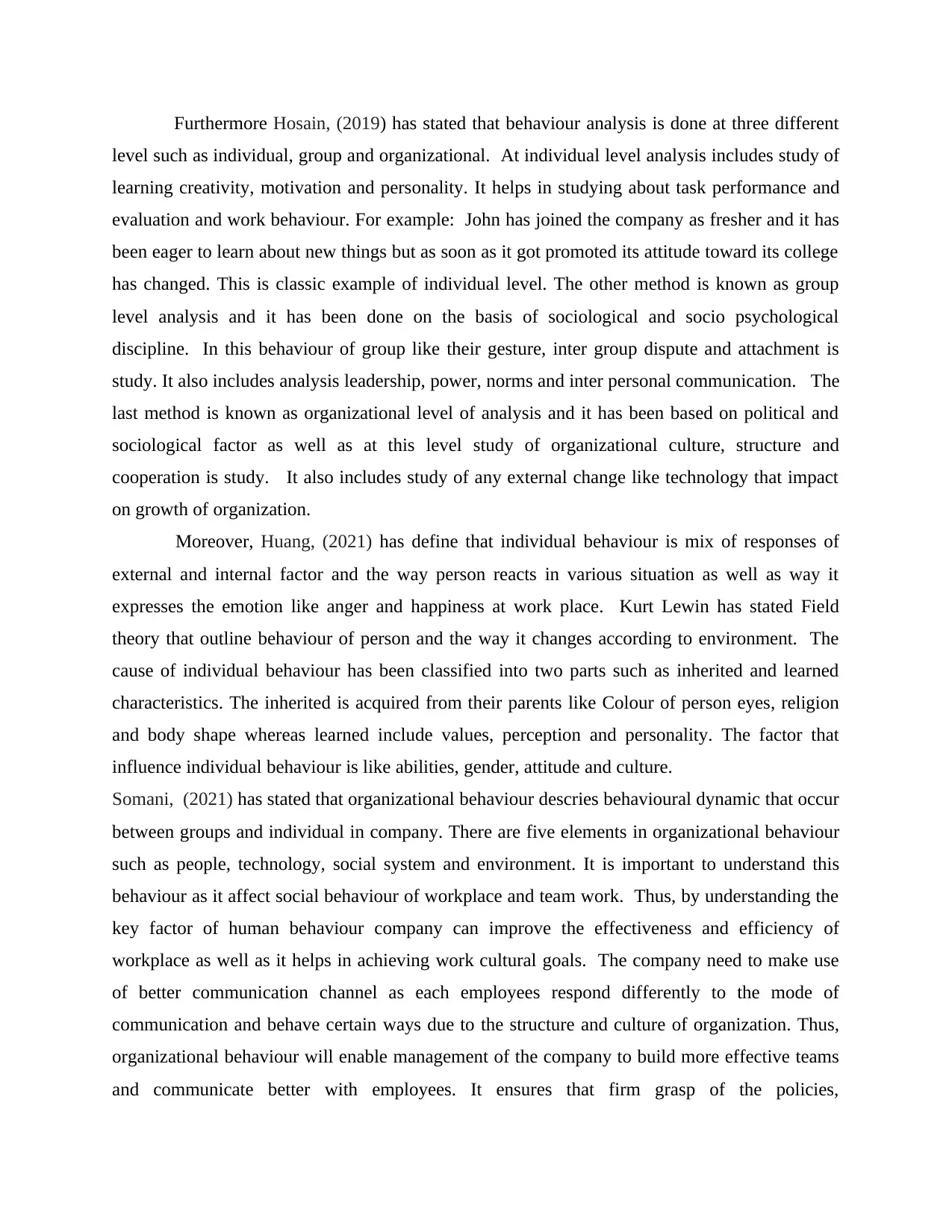
Furthermore Hosain, (2019) has stated that behaviour analysis is done at three different
level such as individual, group and organizational. At individual level analysis includes study of
learning creativity, motivation and personality. It helps in studying about task performance and
evaluation and work behaviour. For example: John has joined the company as fresher and it has
been eager to learn about new things but as soon as it got promoted its attitude toward its college
has changed. This is classic example of individual level. The other method is known as group
level analysis and it has been done on the basis of sociological and socio psychological
discipline. In this behaviour of group like their gesture, inter group dispute and attachment is
study. It also includes analysis leadership, power, norms and inter personal communication. The
last method is known as organizational level of analysis and it has been based on political and
sociological factor as well as at this level study of organizational culture, structure and
cooperation is study. It also includes study of any external change like technology that impact
on growth of organization.
Moreover, Huang, (2021) has define that individual behaviour is mix of responses of
external and internal factor and the way person reacts in various situation as well as way it
expresses the emotion like anger and happiness at work place. Kurt Lewin has stated Field
theory that outline behaviour of person and the way it changes according to environment. The
cause of individual behaviour has been classified into two parts such as inherited and learned
characteristics. The inherited is acquired from their parents like Colour of person eyes, religion
and body shape whereas learned include values, perception and personality. The factor that
influence individual behaviour is like abilities, gender, attitude and culture.
Somani, (2021) has stated that organizational behaviour descries behavioural dynamic that occur
between groups and individual in company. There are five elements in organizational behaviour
such as people, technology, social system and environment. It is important to understand this
behaviour as it affect social behaviour of workplace and team work. Thus, by understanding the
key factor of human behaviour company can improve the effectiveness and efficiency of
workplace as well as it helps in achieving work cultural goals. The company need to make use
of better communication channel as each employees respond differently to the mode of
communication and behave certain ways due to the structure and culture of organization. Thus,
organizational behaviour will enable management of the company to build more effective teams
and communicate better with employees. It ensures that firm grasp of the policies,
level such as individual, group and organizational. At individual level analysis includes study of
learning creativity, motivation and personality. It helps in studying about task performance and
evaluation and work behaviour. For example: John has joined the company as fresher and it has
been eager to learn about new things but as soon as it got promoted its attitude toward its college
has changed. This is classic example of individual level. The other method is known as group
level analysis and it has been done on the basis of sociological and socio psychological
discipline. In this behaviour of group like their gesture, inter group dispute and attachment is
study. It also includes analysis leadership, power, norms and inter personal communication. The
last method is known as organizational level of analysis and it has been based on political and
sociological factor as well as at this level study of organizational culture, structure and
cooperation is study. It also includes study of any external change like technology that impact
on growth of organization.
Moreover, Huang, (2021) has define that individual behaviour is mix of responses of
external and internal factor and the way person reacts in various situation as well as way it
expresses the emotion like anger and happiness at work place. Kurt Lewin has stated Field
theory that outline behaviour of person and the way it changes according to environment. The
cause of individual behaviour has been classified into two parts such as inherited and learned
characteristics. The inherited is acquired from their parents like Colour of person eyes, religion
and body shape whereas learned include values, perception and personality. The factor that
influence individual behaviour is like abilities, gender, attitude and culture.
Somani, (2021) has stated that organizational behaviour descries behavioural dynamic that occur
between groups and individual in company. There are five elements in organizational behaviour
such as people, technology, social system and environment. It is important to understand this
behaviour as it affect social behaviour of workplace and team work. Thus, by understanding the
key factor of human behaviour company can improve the effectiveness and efficiency of
workplace as well as it helps in achieving work cultural goals. The company need to make use
of better communication channel as each employees respond differently to the mode of
communication and behave certain ways due to the structure and culture of organization. Thus,
organizational behaviour will enable management of the company to build more effective teams
and communicate better with employees. It ensures that firm grasp of the policies,
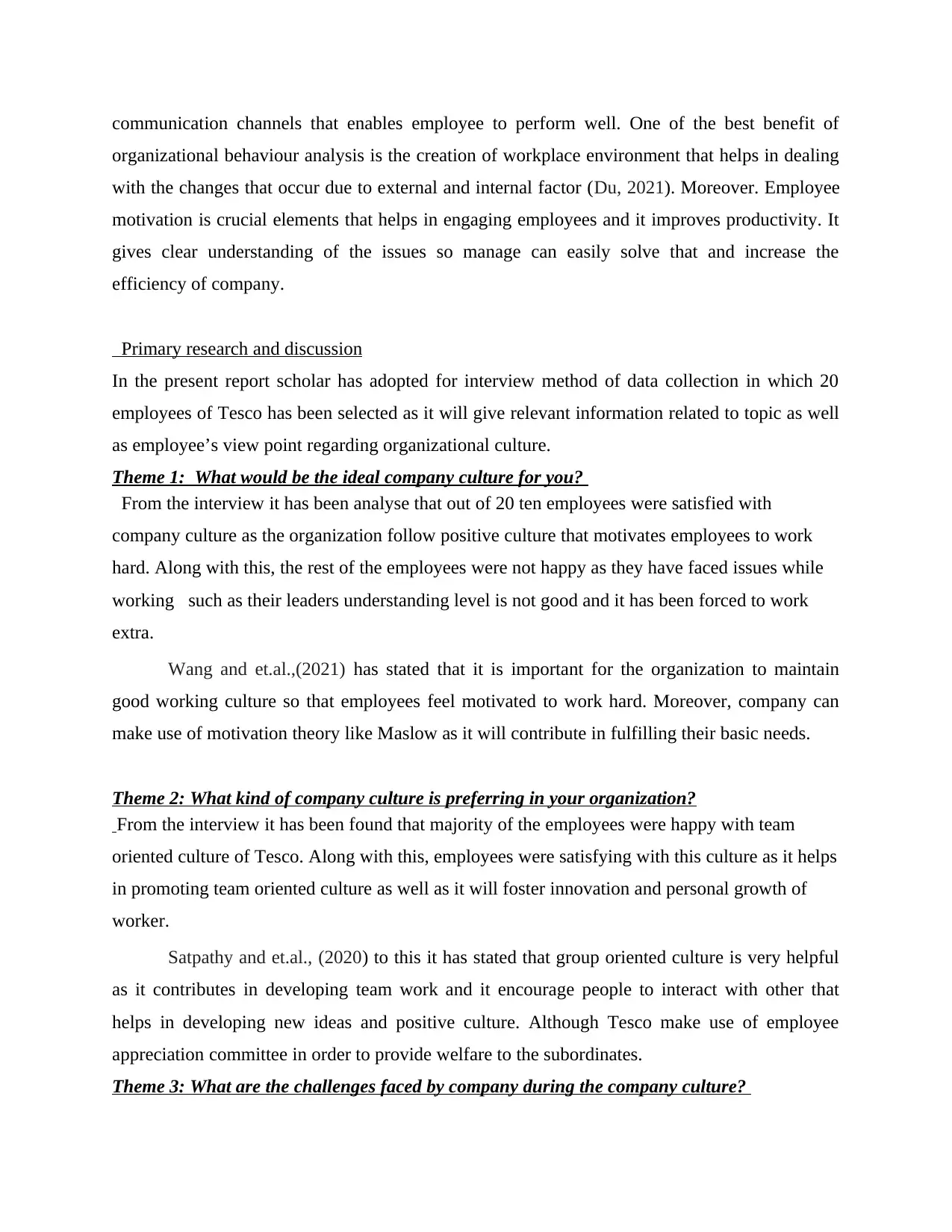
communication channels that enables employee to perform well. One of the best benefit of
organizational behaviour analysis is the creation of workplace environment that helps in dealing
with the changes that occur due to external and internal factor (Du, 2021). Moreover. Employee
motivation is crucial elements that helps in engaging employees and it improves productivity. It
gives clear understanding of the issues so manage can easily solve that and increase the
efficiency of company.
Primary research and discussion
In the present report scholar has adopted for interview method of data collection in which 20
employees of Tesco has been selected as it will give relevant information related to topic as well
as employee’s view point regarding organizational culture.
Theme 1: What would be the ideal company culture for you?
From the interview it has been analyse that out of 20 ten employees were satisfied with
company culture as the organization follow positive culture that motivates employees to work
hard. Along with this, the rest of the employees were not happy as they have faced issues while
working such as their leaders understanding level is not good and it has been forced to work
extra.
Wang and et.al.,(2021) has stated that it is important for the organization to maintain
good working culture so that employees feel motivated to work hard. Moreover, company can
make use of motivation theory like Maslow as it will contribute in fulfilling their basic needs.
Theme 2: What kind of company culture is preferring in your organization?
From the interview it has been found that majority of the employees were happy with team
oriented culture of Tesco. Along with this, employees were satisfying with this culture as it helps
in promoting team oriented culture as well as it will foster innovation and personal growth of
worker.
Satpathy and et.al., (2020) to this it has stated that group oriented culture is very helpful
as it contributes in developing team work and it encourage people to interact with other that
helps in developing new ideas and positive culture. Although Tesco make use of employee
appreciation committee in order to provide welfare to the subordinates.
Theme 3: What are the challenges faced by company during the company culture?
organizational behaviour analysis is the creation of workplace environment that helps in dealing
with the changes that occur due to external and internal factor (Du, 2021). Moreover. Employee
motivation is crucial elements that helps in engaging employees and it improves productivity. It
gives clear understanding of the issues so manage can easily solve that and increase the
efficiency of company.
Primary research and discussion
In the present report scholar has adopted for interview method of data collection in which 20
employees of Tesco has been selected as it will give relevant information related to topic as well
as employee’s view point regarding organizational culture.
Theme 1: What would be the ideal company culture for you?
From the interview it has been analyse that out of 20 ten employees were satisfied with
company culture as the organization follow positive culture that motivates employees to work
hard. Along with this, the rest of the employees were not happy as they have faced issues while
working such as their leaders understanding level is not good and it has been forced to work
extra.
Wang and et.al.,(2021) has stated that it is important for the organization to maintain
good working culture so that employees feel motivated to work hard. Moreover, company can
make use of motivation theory like Maslow as it will contribute in fulfilling their basic needs.
Theme 2: What kind of company culture is preferring in your organization?
From the interview it has been found that majority of the employees were happy with team
oriented culture of Tesco. Along with this, employees were satisfying with this culture as it helps
in promoting team oriented culture as well as it will foster innovation and personal growth of
worker.
Satpathy and et.al., (2020) to this it has stated that group oriented culture is very helpful
as it contributes in developing team work and it encourage people to interact with other that
helps in developing new ideas and positive culture. Although Tesco make use of employee
appreciation committee in order to provide welfare to the subordinates.
Theme 3: What are the challenges faced by company during the company culture?
⊘ This is a preview!⊘
Do you want full access?
Subscribe today to unlock all pages.

Trusted by 1+ million students worldwide
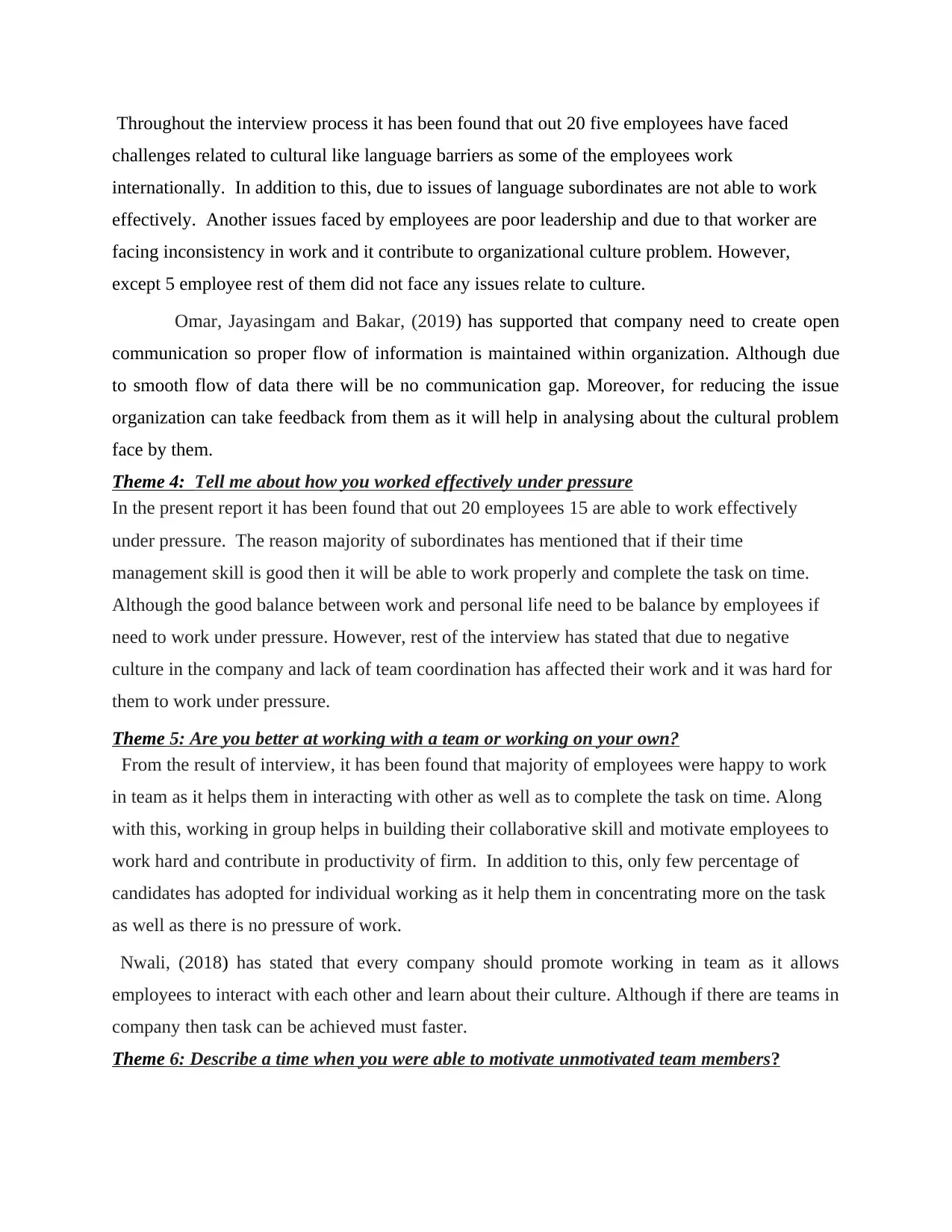
Throughout the interview process it has been found that out 20 five employees have faced
challenges related to cultural like language barriers as some of the employees work
internationally. In addition to this, due to issues of language subordinates are not able to work
effectively. Another issues faced by employees are poor leadership and due to that worker are
facing inconsistency in work and it contribute to organizational culture problem. However,
except 5 employee rest of them did not face any issues relate to culture.
Omar, Jayasingam and Bakar, (2019) has supported that company need to create open
communication so proper flow of information is maintained within organization. Although due
to smooth flow of data there will be no communication gap. Moreover, for reducing the issue
organization can take feedback from them as it will help in analysing about the cultural problem
face by them.
Theme 4: Tell me about how you worked effectively under pressure
In the present report it has been found that out 20 employees 15 are able to work effectively
under pressure. The reason majority of subordinates has mentioned that if their time
management skill is good then it will be able to work properly and complete the task on time.
Although the good balance between work and personal life need to be balance by employees if
need to work under pressure. However, rest of the interview has stated that due to negative
culture in the company and lack of team coordination has affected their work and it was hard for
them to work under pressure.
Theme 5: Are you better at working with a team or working on your own?
From the result of interview, it has been found that majority of employees were happy to work
in team as it helps them in interacting with other as well as to complete the task on time. Along
with this, working in group helps in building their collaborative skill and motivate employees to
work hard and contribute in productivity of firm. In addition to this, only few percentage of
candidates has adopted for individual working as it help them in concentrating more on the task
as well as there is no pressure of work.
Nwali, (2018) has stated that every company should promote working in team as it allows
employees to interact with each other and learn about their culture. Although if there are teams in
company then task can be achieved must faster.
Theme 6: Describe a time when you were able to motivate unmotivated team members?
challenges related to cultural like language barriers as some of the employees work
internationally. In addition to this, due to issues of language subordinates are not able to work
effectively. Another issues faced by employees are poor leadership and due to that worker are
facing inconsistency in work and it contribute to organizational culture problem. However,
except 5 employee rest of them did not face any issues relate to culture.
Omar, Jayasingam and Bakar, (2019) has supported that company need to create open
communication so proper flow of information is maintained within organization. Although due
to smooth flow of data there will be no communication gap. Moreover, for reducing the issue
organization can take feedback from them as it will help in analysing about the cultural problem
face by them.
Theme 4: Tell me about how you worked effectively under pressure
In the present report it has been found that out 20 employees 15 are able to work effectively
under pressure. The reason majority of subordinates has mentioned that if their time
management skill is good then it will be able to work properly and complete the task on time.
Although the good balance between work and personal life need to be balance by employees if
need to work under pressure. However, rest of the interview has stated that due to negative
culture in the company and lack of team coordination has affected their work and it was hard for
them to work under pressure.
Theme 5: Are you better at working with a team or working on your own?
From the result of interview, it has been found that majority of employees were happy to work
in team as it helps them in interacting with other as well as to complete the task on time. Along
with this, working in group helps in building their collaborative skill and motivate employees to
work hard and contribute in productivity of firm. In addition to this, only few percentage of
candidates has adopted for individual working as it help them in concentrating more on the task
as well as there is no pressure of work.
Nwali, (2018) has stated that every company should promote working in team as it allows
employees to interact with each other and learn about their culture. Although if there are teams in
company then task can be achieved must faster.
Theme 6: Describe a time when you were able to motivate unmotivated team members?
Paraphrase This Document
Need a fresh take? Get an instant paraphrase of this document with our AI Paraphraser
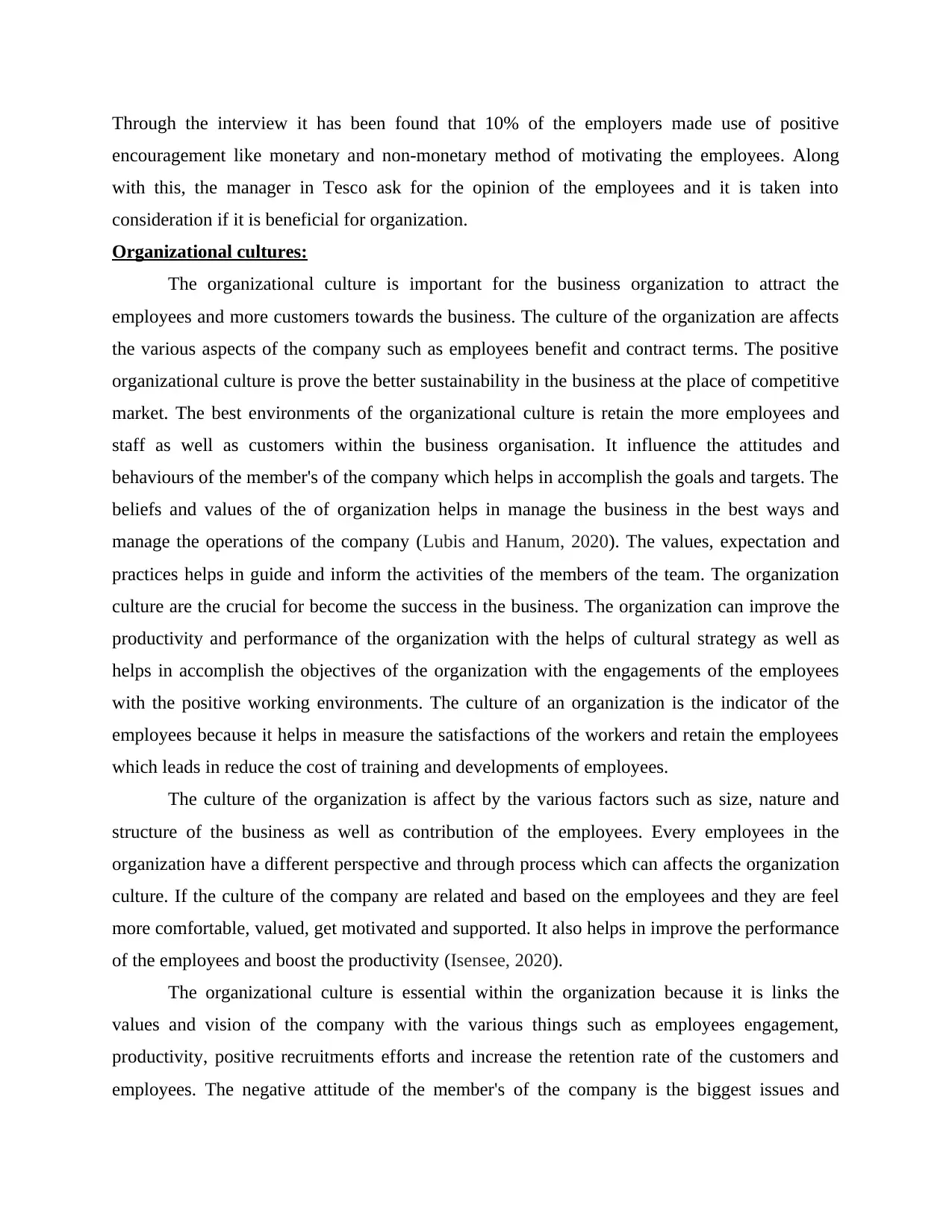
Through the interview it has been found that 10% of the employers made use of positive
encouragement like monetary and non-monetary method of motivating the employees. Along
with this, the manager in Tesco ask for the opinion of the employees and it is taken into
consideration if it is beneficial for organization.
Organizational cultures:
The organizational culture is important for the business organization to attract the
employees and more customers towards the business. The culture of the organization are affects
the various aspects of the company such as employees benefit and contract terms. The positive
organizational culture is prove the better sustainability in the business at the place of competitive
market. The best environments of the organizational culture is retain the more employees and
staff as well as customers within the business organisation. It influence the attitudes and
behaviours of the member's of the company which helps in accomplish the goals and targets. The
beliefs and values of the of organization helps in manage the business in the best ways and
manage the operations of the company (Lubis and Hanum, 2020). The values, expectation and
practices helps in guide and inform the activities of the members of the team. The organization
culture are the crucial for become the success in the business. The organization can improve the
productivity and performance of the organization with the helps of cultural strategy as well as
helps in accomplish the objectives of the organization with the engagements of the employees
with the positive working environments. The culture of an organization is the indicator of the
employees because it helps in measure the satisfactions of the workers and retain the employees
which leads in reduce the cost of training and developments of employees.
The culture of the organization is affect by the various factors such as size, nature and
structure of the business as well as contribution of the employees. Every employees in the
organization have a different perspective and through process which can affects the organization
culture. If the culture of the company are related and based on the employees and they are feel
more comfortable, valued, get motivated and supported. It also helps in improve the performance
of the employees and boost the productivity (Isensee, 2020).
The organizational culture is essential within the organization because it is links the
values and vision of the company with the various things such as employees engagement,
productivity, positive recruitments efforts and increase the retention rate of the customers and
employees. The negative attitude of the member's of the company is the biggest issues and
encouragement like monetary and non-monetary method of motivating the employees. Along
with this, the manager in Tesco ask for the opinion of the employees and it is taken into
consideration if it is beneficial for organization.
Organizational cultures:
The organizational culture is important for the business organization to attract the
employees and more customers towards the business. The culture of the organization are affects
the various aspects of the company such as employees benefit and contract terms. The positive
organizational culture is prove the better sustainability in the business at the place of competitive
market. The best environments of the organizational culture is retain the more employees and
staff as well as customers within the business organisation. It influence the attitudes and
behaviours of the member's of the company which helps in accomplish the goals and targets. The
beliefs and values of the of organization helps in manage the business in the best ways and
manage the operations of the company (Lubis and Hanum, 2020). The values, expectation and
practices helps in guide and inform the activities of the members of the team. The organization
culture are the crucial for become the success in the business. The organization can improve the
productivity and performance of the organization with the helps of cultural strategy as well as
helps in accomplish the objectives of the organization with the engagements of the employees
with the positive working environments. The culture of an organization is the indicator of the
employees because it helps in measure the satisfactions of the workers and retain the employees
which leads in reduce the cost of training and developments of employees.
The culture of the organization is affect by the various factors such as size, nature and
structure of the business as well as contribution of the employees. Every employees in the
organization have a different perspective and through process which can affects the organization
culture. If the culture of the company are related and based on the employees and they are feel
more comfortable, valued, get motivated and supported. It also helps in improve the performance
of the employees and boost the productivity (Isensee, 2020).
The organizational culture is essential within the organization because it is links the
values and vision of the company with the various things such as employees engagement,
productivity, positive recruitments efforts and increase the retention rate of the customers and
employees. The negative attitude of the member's of the company is the biggest issues and
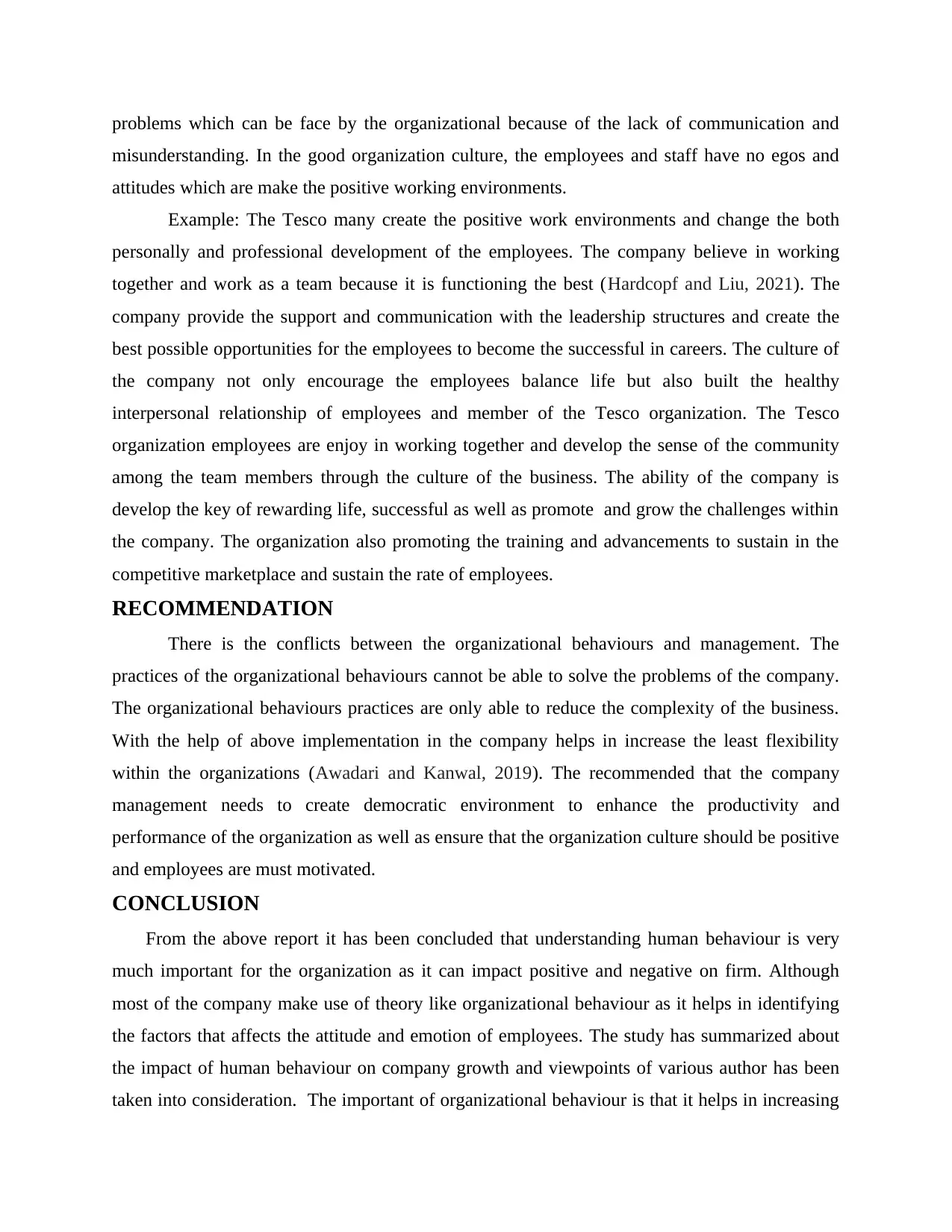
problems which can be face by the organizational because of the lack of communication and
misunderstanding. In the good organization culture, the employees and staff have no egos and
attitudes which are make the positive working environments.
Example: The Tesco many create the positive work environments and change the both
personally and professional development of the employees. The company believe in working
together and work as a team because it is functioning the best (Hardcopf and Liu, 2021). The
company provide the support and communication with the leadership structures and create the
best possible opportunities for the employees to become the successful in careers. The culture of
the company not only encourage the employees balance life but also built the healthy
interpersonal relationship of employees and member of the Tesco organization. The Tesco
organization employees are enjoy in working together and develop the sense of the community
among the team members through the culture of the business. The ability of the company is
develop the key of rewarding life, successful as well as promote and grow the challenges within
the company. The organization also promoting the training and advancements to sustain in the
competitive marketplace and sustain the rate of employees.
RECOMMENDATION
There is the conflicts between the organizational behaviours and management. The
practices of the organizational behaviours cannot be able to solve the problems of the company.
The organizational behaviours practices are only able to reduce the complexity of the business.
With the help of above implementation in the company helps in increase the least flexibility
within the organizations (Awadari and Kanwal, 2019). The recommended that the company
management needs to create democratic environment to enhance the productivity and
performance of the organization as well as ensure that the organization culture should be positive
and employees are must motivated.
CONCLUSION
From the above report it has been concluded that understanding human behaviour is very
much important for the organization as it can impact positive and negative on firm. Although
most of the company make use of theory like organizational behaviour as it helps in identifying
the factors that affects the attitude and emotion of employees. The study has summarized about
the impact of human behaviour on company growth and viewpoints of various author has been
taken into consideration. The important of organizational behaviour is that it helps in increasing
misunderstanding. In the good organization culture, the employees and staff have no egos and
attitudes which are make the positive working environments.
Example: The Tesco many create the positive work environments and change the both
personally and professional development of the employees. The company believe in working
together and work as a team because it is functioning the best (Hardcopf and Liu, 2021). The
company provide the support and communication with the leadership structures and create the
best possible opportunities for the employees to become the successful in careers. The culture of
the company not only encourage the employees balance life but also built the healthy
interpersonal relationship of employees and member of the Tesco organization. The Tesco
organization employees are enjoy in working together and develop the sense of the community
among the team members through the culture of the business. The ability of the company is
develop the key of rewarding life, successful as well as promote and grow the challenges within
the company. The organization also promoting the training and advancements to sustain in the
competitive marketplace and sustain the rate of employees.
RECOMMENDATION
There is the conflicts between the organizational behaviours and management. The
practices of the organizational behaviours cannot be able to solve the problems of the company.
The organizational behaviours practices are only able to reduce the complexity of the business.
With the help of above implementation in the company helps in increase the least flexibility
within the organizations (Awadari and Kanwal, 2019). The recommended that the company
management needs to create democratic environment to enhance the productivity and
performance of the organization as well as ensure that the organization culture should be positive
and employees are must motivated.
CONCLUSION
From the above report it has been concluded that understanding human behaviour is very
much important for the organization as it can impact positive and negative on firm. Although
most of the company make use of theory like organizational behaviour as it helps in identifying
the factors that affects the attitude and emotion of employees. The study has summarized about
the impact of human behaviour on company growth and viewpoints of various author has been
taken into consideration. The important of organizational behaviour is that it helps in increasing
⊘ This is a preview!⊘
Do you want full access?
Subscribe today to unlock all pages.

Trusted by 1+ million students worldwide
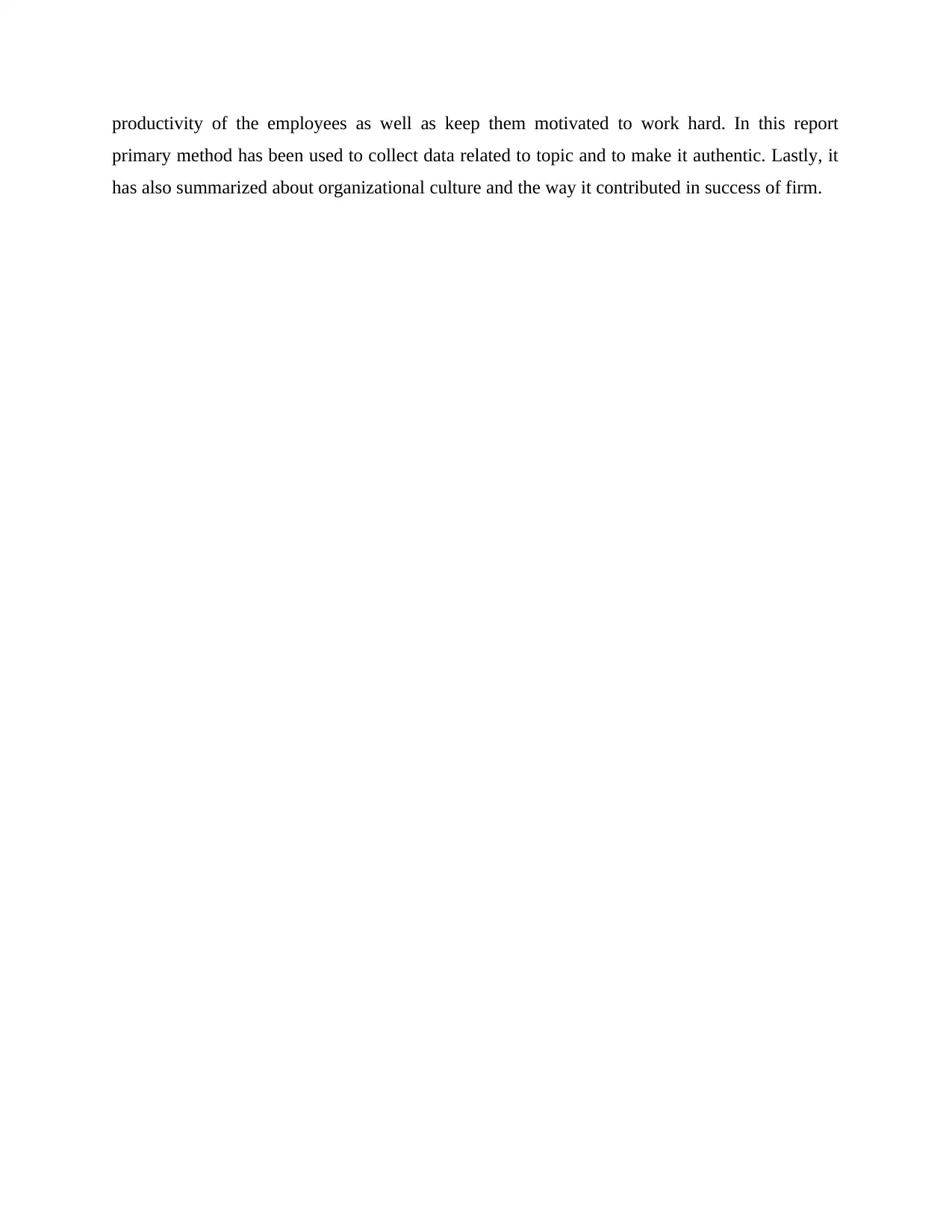
productivity of the employees as well as keep them motivated to work hard. In this report
primary method has been used to collect data related to topic and to make it authentic. Lastly, it
has also summarized about organizational culture and the way it contributed in success of firm.
primary method has been used to collect data related to topic and to make it authentic. Lastly, it
has also summarized about organizational culture and the way it contributed in success of firm.
Paraphrase This Document
Need a fresh take? Get an instant paraphrase of this document with our AI Paraphraser
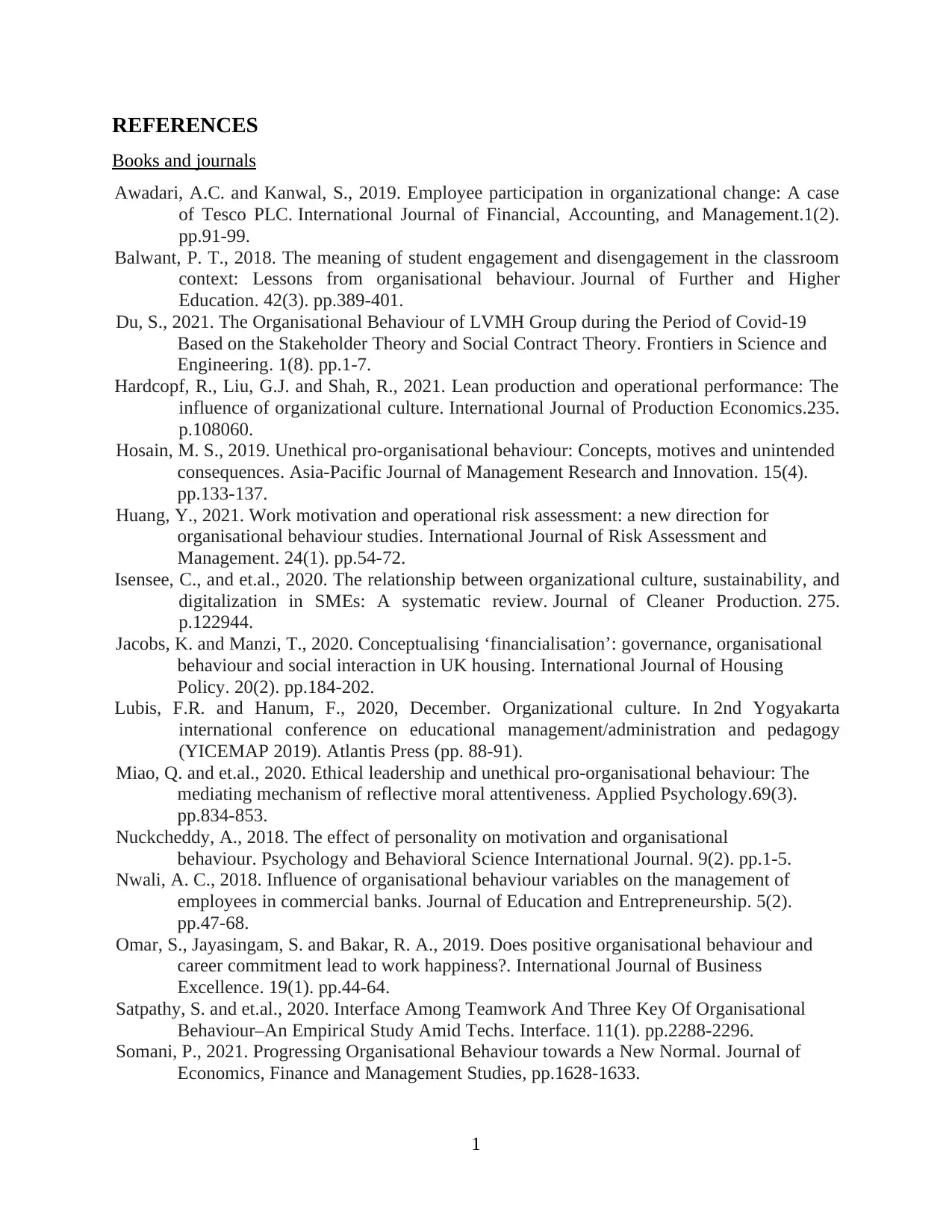
REFERENCES
Books and journals
Awadari, A.C. and Kanwal, S., 2019. Employee participation in organizational change: A case
of Tesco PLC. International Journal of Financial, Accounting, and Management.1(2).
pp.91-99.
Balwant, P. T., 2018. The meaning of student engagement and disengagement in the classroom
context: Lessons from organisational behaviour. Journal of Further and Higher
Education. 42(3). pp.389-401.
Du, S., 2021. The Organisational Behaviour of LVMH Group during the Period of Covid‐19
Based on the Stakeholder Theory and Social Contract Theory. Frontiers in Science and
Engineering. 1(8). pp.1-7.
Hardcopf, R., Liu, G.J. and Shah, R., 2021. Lean production and operational performance: The
influence of organizational culture. International Journal of Production Economics.235.
p.108060.
Hosain, M. S., 2019. Unethical pro-organisational behaviour: Concepts, motives and unintended
consequences. Asia-Pacific Journal of Management Research and Innovation. 15(4).
pp.133-137.
Huang, Y., 2021. Work motivation and operational risk assessment: a new direction for
organisational behaviour studies. International Journal of Risk Assessment and
Management. 24(1). pp.54-72.
Isensee, C., and et.al., 2020. The relationship between organizational culture, sustainability, and
digitalization in SMEs: A systematic review. Journal of Cleaner Production. 275.
p.122944.
Jacobs, K. and Manzi, T., 2020. Conceptualising ‘financialisation’: governance, organisational
behaviour and social interaction in UK housing. International Journal of Housing
Policy. 20(2). pp.184-202.
Lubis, F.R. and Hanum, F., 2020, December. Organizational culture. In 2nd Yogyakarta
international conference on educational management/administration and pedagogy
(YICEMAP 2019). Atlantis Press (pp. 88-91).
Miao, Q. and et.al., 2020. Ethical leadership and unethical pro‐organisational behaviour: The
mediating mechanism of reflective moral attentiveness. Applied Psychology.69(3).
pp.834-853.
Nuckcheddy, A., 2018. The effect of personality on motivation and organisational
behaviour. Psychology and Behavioral Science International Journal. 9(2). pp.1-5.
Nwali, A. C., 2018. Influence of organisational behaviour variables on the management of
employees in commercial banks. Journal of Education and Entrepreneurship. 5(2).
pp.47-68.
Omar, S., Jayasingam, S. and Bakar, R. A., 2019. Does positive organisational behaviour and
career commitment lead to work happiness?. International Journal of Business
Excellence. 19(1). pp.44-64.
Satpathy, S. and et.al., 2020. Interface Among Teamwork And Three Key Of Organisational
Behaviour–An Empirical Study Amid Techs. Interface. 11(1). pp.2288-2296.
Somani, P., 2021. Progressing Organisational Behaviour towards a New Normal. Journal of
Economics, Finance and Management Studies, pp.1628-1633.
1
Books and journals
Awadari, A.C. and Kanwal, S., 2019. Employee participation in organizational change: A case
of Tesco PLC. International Journal of Financial, Accounting, and Management.1(2).
pp.91-99.
Balwant, P. T., 2018. The meaning of student engagement and disengagement in the classroom
context: Lessons from organisational behaviour. Journal of Further and Higher
Education. 42(3). pp.389-401.
Du, S., 2021. The Organisational Behaviour of LVMH Group during the Period of Covid‐19
Based on the Stakeholder Theory and Social Contract Theory. Frontiers in Science and
Engineering. 1(8). pp.1-7.
Hardcopf, R., Liu, G.J. and Shah, R., 2021. Lean production and operational performance: The
influence of organizational culture. International Journal of Production Economics.235.
p.108060.
Hosain, M. S., 2019. Unethical pro-organisational behaviour: Concepts, motives and unintended
consequences. Asia-Pacific Journal of Management Research and Innovation. 15(4).
pp.133-137.
Huang, Y., 2021. Work motivation and operational risk assessment: a new direction for
organisational behaviour studies. International Journal of Risk Assessment and
Management. 24(1). pp.54-72.
Isensee, C., and et.al., 2020. The relationship between organizational culture, sustainability, and
digitalization in SMEs: A systematic review. Journal of Cleaner Production. 275.
p.122944.
Jacobs, K. and Manzi, T., 2020. Conceptualising ‘financialisation’: governance, organisational
behaviour and social interaction in UK housing. International Journal of Housing
Policy. 20(2). pp.184-202.
Lubis, F.R. and Hanum, F., 2020, December. Organizational culture. In 2nd Yogyakarta
international conference on educational management/administration and pedagogy
(YICEMAP 2019). Atlantis Press (pp. 88-91).
Miao, Q. and et.al., 2020. Ethical leadership and unethical pro‐organisational behaviour: The
mediating mechanism of reflective moral attentiveness. Applied Psychology.69(3).
pp.834-853.
Nuckcheddy, A., 2018. The effect of personality on motivation and organisational
behaviour. Psychology and Behavioral Science International Journal. 9(2). pp.1-5.
Nwali, A. C., 2018. Influence of organisational behaviour variables on the management of
employees in commercial banks. Journal of Education and Entrepreneurship. 5(2).
pp.47-68.
Omar, S., Jayasingam, S. and Bakar, R. A., 2019. Does positive organisational behaviour and
career commitment lead to work happiness?. International Journal of Business
Excellence. 19(1). pp.44-64.
Satpathy, S. and et.al., 2020. Interface Among Teamwork And Three Key Of Organisational
Behaviour–An Empirical Study Amid Techs. Interface. 11(1). pp.2288-2296.
Somani, P., 2021. Progressing Organisational Behaviour towards a New Normal. Journal of
Economics, Finance and Management Studies, pp.1628-1633.
1
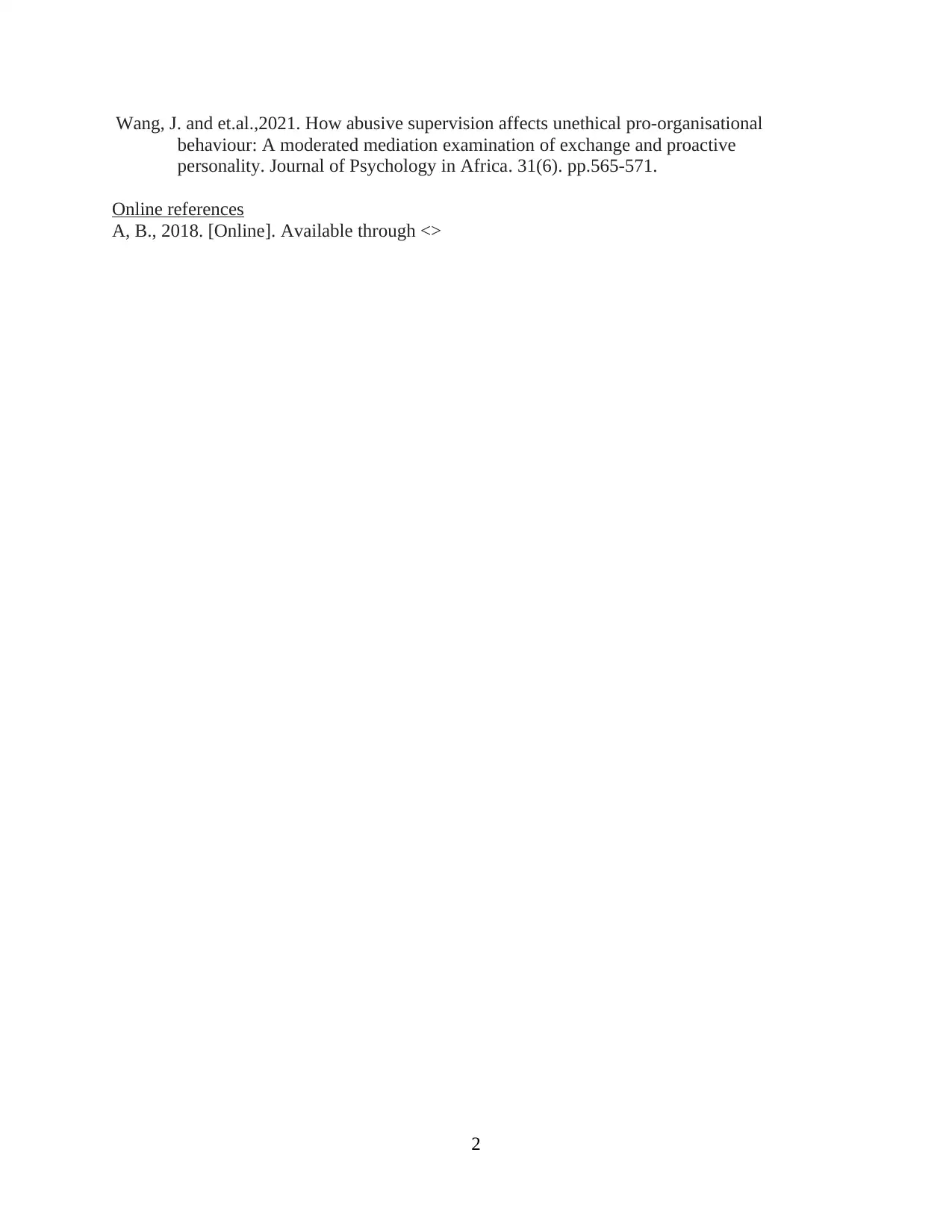
Wang, J. and et.al.,2021. How abusive supervision affects unethical pro-organisational
behaviour: A moderated mediation examination of exchange and proactive
personality. Journal of Psychology in Africa. 31(6). pp.565-571.
Online references
A, B., 2018. [Online]. Available through <>
2
behaviour: A moderated mediation examination of exchange and proactive
personality. Journal of Psychology in Africa. 31(6). pp.565-571.
Online references
A, B., 2018. [Online]. Available through <>
2
⊘ This is a preview!⊘
Do you want full access?
Subscribe today to unlock all pages.

Trusted by 1+ million students worldwide
1 out of 13
Related Documents
Your All-in-One AI-Powered Toolkit for Academic Success.
+13062052269
info@desklib.com
Available 24*7 on WhatsApp / Email
![[object Object]](/_next/static/media/star-bottom.7253800d.svg)
Unlock your academic potential
Copyright © 2020–2026 A2Z Services. All Rights Reserved. Developed and managed by ZUCOL.




